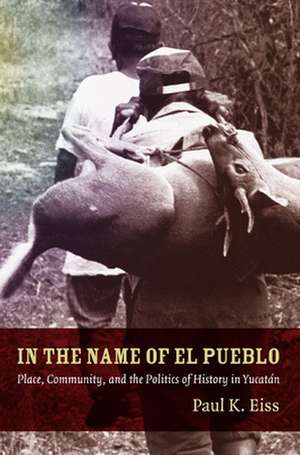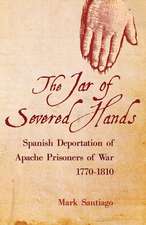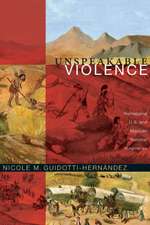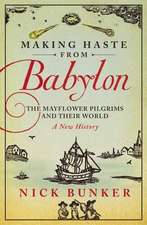In the Name of El Pueblo – Place, Community, and the Politics of History in Yucatán: Latin America Otherwise
Autor Paul Eissen Limba Engleză Paperback – 29 iul 2010
Din seria Latin America Otherwise
-
 Preț: 161.02 lei
Preț: 161.02 lei -
 Preț: 195.84 lei
Preț: 195.84 lei -
 Preț: 169.48 lei
Preț: 169.48 lei -
 Preț: 218.61 lei
Preț: 218.61 lei -
 Preț: 261.93 lei
Preț: 261.93 lei -
 Preț: 301.59 lei
Preț: 301.59 lei -
 Preț: 264.26 lei
Preț: 264.26 lei -
 Preț: 231.22 lei
Preț: 231.22 lei -
 Preț: 302.36 lei
Preț: 302.36 lei -
 Preț: 265.20 lei
Preț: 265.20 lei -
 Preț: 191.54 lei
Preț: 191.54 lei -
 Preț: 240.90 lei
Preț: 240.90 lei -
 Preț: 299.29 lei
Preț: 299.29 lei -
 Preț: 301.38 lei
Preț: 301.38 lei -
 Preț: 211.33 lei
Preț: 211.33 lei -
 Preț: 261.18 lei
Preț: 261.18 lei -
 Preț: 239.76 lei
Preț: 239.76 lei -
 Preț: 265.59 lei
Preț: 265.59 lei -
 Preț: 305.46 lei
Preț: 305.46 lei -
 Preț: 237.47 lei
Preț: 237.47 lei -
 Preț: 262.32 lei
Preț: 262.32 lei -
 Preț: 265.79 lei
Preț: 265.79 lei -
 Preț: 263.29 lei
Preț: 263.29 lei -
 Preț: 298.70 lei
Preț: 298.70 lei -
 Preț: 324.80 lei
Preț: 324.80 lei -
 Preț: 264.43 lei
Preț: 264.43 lei -
 Preț: 238.39 lei
Preț: 238.39 lei -
 Preț: 383.63 lei
Preț: 383.63 lei -
 Preț: 264.26 lei
Preț: 264.26 lei -
 Preț: 236.67 lei
Preț: 236.67 lei -
 Preț: 306.99 lei
Preț: 306.99 lei -
 Preț: 236.10 lei
Preț: 236.10 lei -
 Preț: 268.68 lei
Preț: 268.68 lei -
 Preț: 300.62 lei
Preț: 300.62 lei -
 Preț: 335.67 lei
Preț: 335.67 lei -
 Preț: 304.31 lei
Preț: 304.31 lei -
 Preț: 308.90 lei
Preț: 308.90 lei -
 Preț: 307.95 lei
Preț: 307.95 lei -
 Preț: 261.38 lei
Preț: 261.38 lei -
 Preț: 264.64 lei
Preț: 264.64 lei -
 Preț: 315.64 lei
Preț: 315.64 lei -
 Preț: 269.27 lei
Preț: 269.27 lei -
 Preț: 327.73 lei
Preț: 327.73 lei -
 Preț: 262.14 lei
Preț: 262.14 lei -
 Preț: 262.32 lei
Preț: 262.32 lei
Preț: 302.19 lei
Nou
Puncte Express: 453
Preț estimativ în valută:
57.85€ • 60.36$ • 48.49£
57.85€ • 60.36$ • 48.49£
Carte tipărită la comandă
Livrare economică 13-27 martie
Preluare comenzi: 021 569.72.76
Specificații
ISBN-13: 9780822347279
ISBN-10: 082234727X
Pagini: 360
Ilustrații: 36 illustrations
Dimensiuni: 156 x 235 x 15 mm
Greutate: 0.52 kg
Editura: MD – Duke University Press
Seria Latin America Otherwise
ISBN-10: 082234727X
Pagini: 360
Ilustrații: 36 illustrations
Dimensiuni: 156 x 235 x 15 mm
Greutate: 0.52 kg
Editura: MD – Duke University Press
Seria Latin America Otherwise
Cuprins
About the Series; Acknowledgments Introduction: From Archive to Ashes Part One. Dispossession 1. The Last Cacique: The Archival Landscapes of Kah, Común, and Pueblo; 2. King of the Forest: Civilization, Savagery, and the Annals of History; 3. Hunucmás Zapata: Objects of Insurgency and Auguries of Liberation Part Two. Repossession 4. The Redemption: Subjects of Revolution and Objects of Governance; 5. The General and the Beast: Murder, Martyrdom, and the Bones of el Pueblo; 6. The Presidents Dead Hand: Surveys, Maps, and the Measure of el Pueblo Part Three. Recognition 7. The War of the Eggs: Tragedy, Redemption, and the Carnivalesque; 8. By the Virgins Grace: The Archival Landscapes of Miracle, Money, and Memory; 9. Poet, Prophet, and Politician: Forgetting and Remembering Hunucmá Conclusion. No-Place Appendix; Notes; Glossary; Bibliography; Index
Recenzii
Few regions of Mexico have elicited as sophisticated a dialogue between history and anthropology as Yucatan has of late. With this volume, Paul K. Eiss positions himself at the crest of this new wave of interdisciplinary scholarship. Daunting in its chronological scope and breadth of research and analysis; pioneering in its interwoven understanding of community, popular politics, state formation, indigenous identity, and historical memory; and distinguished by a meticulously crafted and often haunting narrative, this volume sets a new standard for the production of Mexican social histories and ethnographies. In the Name of El Pueblo is a splendid achievement, not least for the probing questions it raises about the nature of history itself.Gilbert M. Joseph, Yale University In the Name of El Pueblo is a must-read for Mexicanists. It offers a masterful, detailed bottom-up view of history. It lays to rest once and for all the idea that Maya peasants remained quiescent and passive until revolutionary generals arrived in 1915 to overturn the old order. It clarifies the different visions of villagers and revolutionary leaders, traces the travails of a revolutionary order in decline, and shows the pitfalls and problems attending the agrarian reform process, a process that continues to define rural land tenure in Mexico.Terry Rugeley, author of Rebellion Now and Forever: Mayas, Hispanics, and Caste War Violence in Yucatán, 18001880
"Few regions of Mexico have elicited as sophisticated a dialogue between history and anthropology as Yucatan has of late. With this volume, Paul K. Eiss positions himself at the crest of this new wave of interdisciplinary scholarship. Daunting in its chronological scope and breadth of research and analysis; pioneering in its interwoven understanding of community, popular politics, state formation, indigenous identity, and historical memory; and distinguished by a meticulously crafted and often haunting narrative, this volume sets a new standard for the production of Mexican social histories and ethnographies. In the Name of El Pueblo is a splendid achievement, not least for the probing questions it raises about the nature of history itself."--Gilbert M. Joseph, Yale University "In the Name of El Pueblo is a must-read for Mexicanists. It offers a masterful, detailed bottom-up view of history. It lays to rest once and for all the idea that Maya peasants remained quiescent and passive until revolutionary generals arrived in 1915 to overturn the old order. It clarifies the different visions of villagers and revolutionary leaders, traces the travails of a revolutionary order in decline, and shows the pitfalls and problems attending the agrarian reform process, a process that continues to define rural land tenure in Mexico."--Terry Rugeley, author of Rebellion Now and Forever: Mayas, Hispanics, and Caste War Violence in Yucatan, 1800-1880
"Few regions of Mexico have elicited as sophisticated a dialogue between history and anthropology as Yucatan has of late. With this volume, Paul K. Eiss positions himself at the crest of this new wave of interdisciplinary scholarship. Daunting in its chronological scope and breadth of research and analysis; pioneering in its interwoven understanding of community, popular politics, state formation, indigenous identity, and historical memory; and distinguished by a meticulously crafted and often haunting narrative, this volume sets a new standard for the production of Mexican social histories and ethnographies. In the Name of El Pueblo is a splendid achievement, not least for the probing questions it raises about the nature of history itself."--Gilbert M. Joseph, Yale University "In the Name of El Pueblo is a must-read for Mexicanists. It offers a masterful, detailed bottom-up view of history. It lays to rest once and for all the idea that Maya peasants remained quiescent and passive until revolutionary generals arrived in 1915 to overturn the old order. It clarifies the different visions of villagers and revolutionary leaders, traces the travails of a revolutionary order in decline, and shows the pitfalls and problems attending the agrarian reform process, a process that continues to define rural land tenure in Mexico."--Terry Rugeley, author of Rebellion Now and Forever: Mayas, Hispanics, and Caste War Violence in Yucatan, 1800-1880
Notă biografică
Textul de pe ultima copertă
""In the Name of El Pueblo" is a must-read for Mexicanists. It offers a masterful, detailed bottom-up view of history. It lays to rest once and for all the idea that Maya peasants remained quiescent and passive until revolutionary generals arrived in 1915 to overturn the old order. It clarifies the different visions of villagers and revolutionary leaders, traces the travails of a revolutionary order in decline, and shows the pitfalls and problems attending the agrarian reform process, a process that continues to define rural land tenure in Mexico."--Terry Rugeley, author of "Rebellion Now and Forever: Mayas, Hispanics, and Caste War Violence in Yucatan, 1800-1880"
Descriere
An anthropological and historical analysis of the multiple meanings of the term el pueblo, among working-class indigenous and mestizo populations in Mexicos Yucatán peninsula















